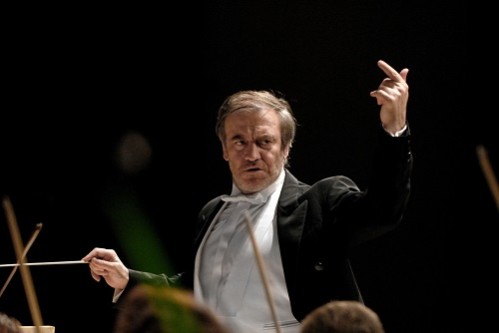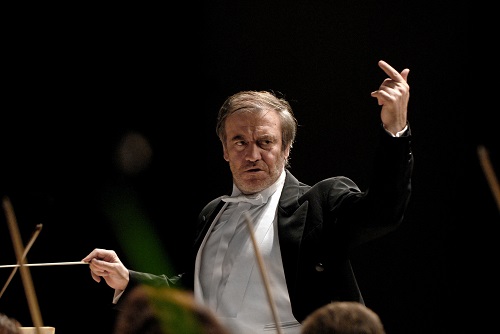 Germany Debussy, Schubert, Mahler: Genia Kühmeier (soprano), Münchner Philharmoniker / Valery Gergiev (conductor), Philharmonie, Munich, 22.3.2017. (MC)
Germany Debussy, Schubert, Mahler: Genia Kühmeier (soprano), Münchner Philharmoniker / Valery Gergiev (conductor), Philharmonie, Munich, 22.3.2017. (MC)

Debussy – Prélude à l’après-midi d’un faune
Schubert – Symphony No.4 ‘Tragic’
Mahler – Symphony No.4
Yesterday evening in Munich Valery Gergiev was an audience member at the Nationaltheater watching the Bayerisches Staatsorchester in concert but tonight at the Philharmonie it was his turn on the podium. Gergiev is music director of the Münchner Philharmoniker and his attractive programme of Debussy, Schubert and Mahler attracted a large audience to the Philharmonie. I noticed that the concert was being recorded for future broadcast.
Opening the concert was Debussy’s much admired masterwork Prélude à l’après-midi d’un faune. Inspired by the poem of the same name by Stéphane Mallarmé, Debussy with his symphonic poem created a magical soundworld, a landmark work in music history. Gergiev underlined the haunting beauty and shimmering intimacy of Debussy’s mysterious, impressionistic soundworld. Striking was the playing of the flute solo and also oboe and clarinet; immaculate throughout.
Rather than programme Schubert’s enduringly popular ‘Unfinished’ and ‘Great’ C major Symphonies it made a welcome change hearing the Symphony No.4 ‘Tragic’. Schubert was at the time of composition in 1816 employed as a teacher in his father’s school. Subtitled the ‘Tragic’ the work inhabits a somewhat serious mood rather than his usual openly congenial style. Gergiev underlined the bittersweet quality of the work by recurrently intensifying then relaxing the tension serving to add to the discernible tragic predilection. In the Andante the underlying melancholic rather introspective quality of the writing lay heavy in Gergiev’s reading. Exciting and resolute the hard driven Finale with its imposing Coda felt almost regal in disposition.
After the interval the audience was treated to Mahler’s Symphony No.4. No orchestra has a closer connection to the symphony than the Münchner Philharmoniker. It was premièred in Munich in 1901 under the composer’s own baton by the Kaim Orchestra, the former name of the Münchner Philharmoniker. Musicologist Deryck Cooke wrote that of the Mahler symphonies the Fourth was, “the simplest and least overshadowed by dark thoughts.” Bright sounding sleigh bells opened the first movement. Gergiev initially provided a comforting and unrushed soundworld before gradually building the weight and the results were impressive. Here I relished the attractive Viennese lilt to the playing that reminded me of verdant Alpine landscapes. Designed as a series of dances the Scherzo has a prominent role for the leader playing a smaller violin in the manner of a village fiddler and also clarinets playing like a Klezmer band. With orchestral playing as fine as I have heard in a long time Gergiev brought out an impressive spectrum of colours. One of Mahler’s most dignified and affecting creations, the slow movement, was handled by Gergiev with a light touch. I was enamoured by the heavenly string playing displaying the ability to play so beautifully soft. Highly effective was the weight of the forceful orchestral climax towards the end of the movement. It was during this clamorous time that soprano soloist Genia Kühmeier walked slowly onto the front of the stage to her microphone position. The final movement of this gratifying symphony uses a setting of ‘Das Himmlische Leben’ (The Heavenly Life) from the Des Knaben Wunderhorn collection of German folk poetry. I enjoyed the soprano’s endearingly fresh and expressive singing of the child’s innocent vision of heaven and she acted the text well which is something I rarely see. Without resorting to emotional excess Gergiev’s well-judged speeds brought the score to rest impressively.
Rich in tone and beautifully focused the Münchner Philharmoniker is a well-balanced orchestra. Noteworthy the string section had a lovely sheen with the low strings emitting a most agreeable mellow timbre. Often a weak link in an orchestra, the horns played beautifully in tune – if louder than I normally hear – with the principal horn giving an outstanding performance of an elevated level which one rarely encounters. The woodwind section was remarkably consistent too. Gergiev’s compelling interpretation of Mahler’s Fourth Symphony was entirely convincing and the performance will stay lodged in the memory.
Michael Cookson
